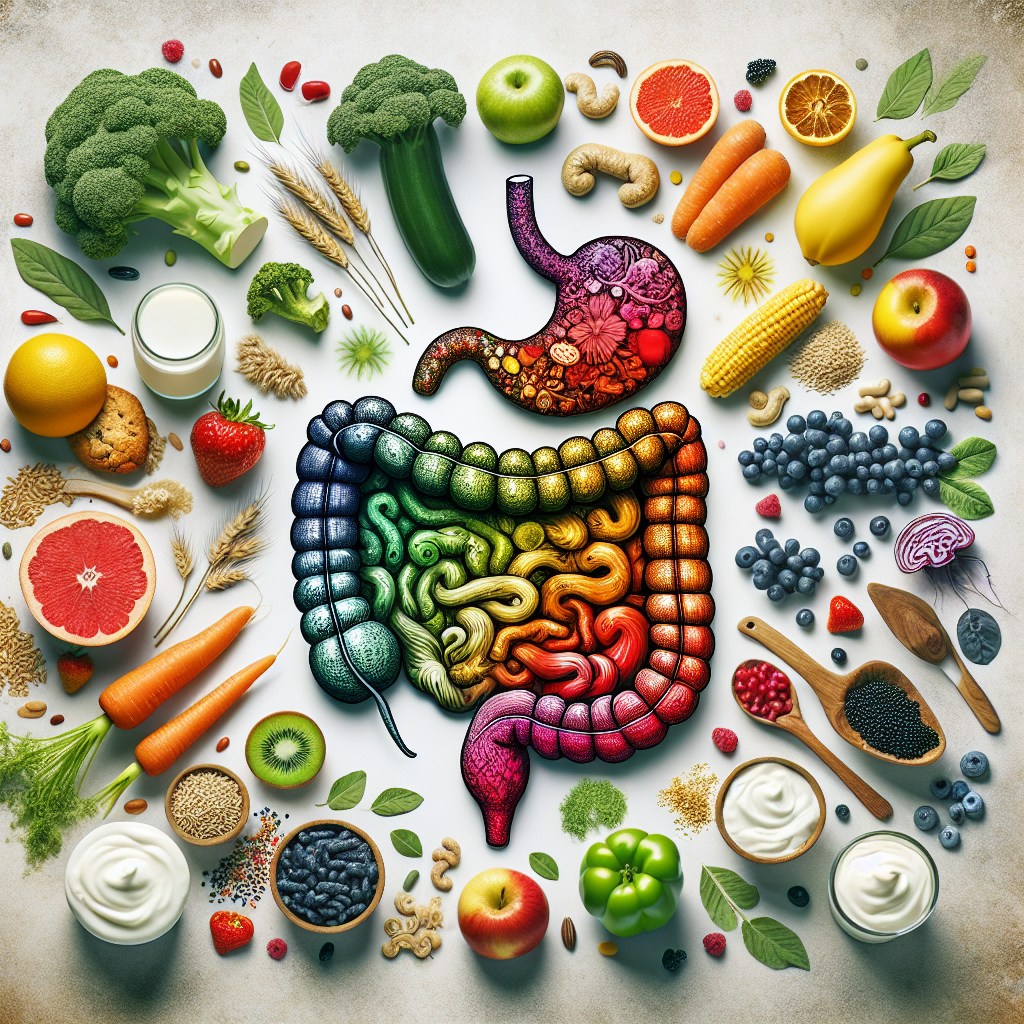Are you looking for ways to improve your digestive health? Look no further, because “Gut-Friendly Nutrition: Enhancing Digestive Health” is here to provide you with some valuable insights. In this article, we will explore the fascinating world of gut-friendly nutrition and how it can benefit your overall well-being. From understanding the importance of a healthy gut to incorporating gut-friendly foods into your diet, we’ve got you covered. So, join us on this journey towards optimal digestive health and discover the power of nourishing your gut.

Table of Contents
The Importance of Gut Health
When it comes to your overall well-being, few things are as important as the health of your gut. Your gut plays a vital role in the digestion and absorption of nutrients, and it is home to billions of microorganisms that make up your gut microbiome. Understanding the importance of gut health is the key to maintaining optimal physical and mental well-being.
Understanding the Gut Microbiome
The gut microbiome refers to the collection of microorganisms, including bacteria, fungi, and viruses, that reside in your digestive tract. These microorganisms play a crucial role in maintaining overall gut health. They assist in the breakdown of food, produce essential vitamins and nutrients, and help regulate your immune system.
Research has shown that the composition of the gut microbiome varies from person to person, and it can also change throughout your lifetime. Factors such as diet, lifestyle, and medications can influence the diversity and balance of your gut microbiome. Maintaining a healthy gut microbiome is essential for proper digestion and overall well-being.
The Role of Gut Health in Overall Well-being
You may be surprised to learn that your gut health can have a significant impact on your overall well-being. A healthy gut is crucial for proper digestion, nutrient absorption, and the elimination of waste from your body. It also plays a vital role in supporting a robust immune system.
Additionally, research has shown a strong link between gut health and mental health. The gut and brain communicate through a complex network called the gut-brain axis. The gut microbiome produces neurotransmitters, such as serotonin and dopamine, which are essential for regulating mood and emotions. Poor gut health has been associated with mental health issues such as anxiety and depression.
Maintaining a healthy gut through proper diet and lifestyle choices is essential for promoting optimal physical and mental well-being.
Basics of Digestive System
To truly understand the importance of gut health, it’s helpful to have a basic understanding of the digestive system. The digestive system is a complex system responsible for breaking down food, absorbing nutrients, and eliminating waste. It consists of several key organs, each with its own unique function.
An Overview of the Digestive System
The digestive system begins with the mouth, where food is chewed and mixed with saliva to begin the digestion process. From there, food travels down the esophagus and enters the stomach. The stomach secretes digestive enzymes and acids to further break down food.
Next, the partially digested food passes into the small intestine, where the majority of nutrient absorption occurs. The small intestine is lined with tiny finger-like projections called villi, which increase the surface area for nutrient absorption. From the small intestine, any undigested food moves into the large intestine, where water absorption takes place.
Finally, waste material is formed into stool and eliminated from the body through the rectum and anus. This entire process is facilitated by the muscles and nerves of the digestive system.
Key Organs and Their Functions
Several organs play a crucial role in the digestive process. The mouth is responsible for chewing and breaking down food, and the salivary glands produce enzymes to aid in digestion. The stomach, as mentioned earlier, secretes digestive enzymes and acids to further break down food.
The small intestine is where the majority of nutrient absorption takes place. It is divided into three sections: the duodenum, jejunum, and ileum. Each section is responsible for absorbing different nutrients, such as carbohydrates, proteins, and fats.
The large intestine, or colon, is primarily responsible for water absorption. It also houses millions of bacteria that assist in the final stages of digestion and the production of vitamins. The rectum and anus are responsible for eliminating waste material from the body.
Understanding the functions of these key organs can help you appreciate the complexity of the digestive system and the importance of maintaining a healthy gut.

Common Digestive Disorders
Unfortunately, the digestive system is not immune to problems. Several common digestive disorders can affect gut health and overall well-being. It’s essential to recognize these disorders and seek appropriate treatment when necessary.
Gastritis
Gastritis is a condition characterized by inflammation of the stomach lining. It can be caused by various factors, including infection, long-term use of certain medications, excessive alcohol consumption, and stress. Gastritis can cause symptoms such as abdominal pain, bloating, nausea, and vomiting. Treatment options may include medication, dietary changes, and stress management techniques.
Acid Reflux
Acid reflux, also known as gastroesophageal reflux disease (GERD), occurs when stomach acid flows back up into the esophagus. This can cause symptoms such as heartburn, regurgitation, and difficulty swallowing. Lifestyle changes, such as avoiding trigger foods and maintaining a healthy weight, can help manage acid reflux. Medications may also be prescribed to reduce stomach acid production.
Irritable Bowel Syndrome
Irritable bowel syndrome (IBS) is a common digestive disorder that affects the large intestine. It is characterized by symptoms such as abdominal pain, bloating, gas, diarrhea, and constipation. The exact cause of IBS is unknown, but triggers can include stress, certain foods, and hormonal changes. Management strategies for IBS may include dietary changes, stress management techniques, and medication.
Constipation
Constipation is a condition characterized by infrequent bowel movements and difficulty passing stools. It can be caused by various factors, including a lack of fiber in the diet, dehydration, and sedentary lifestyle. Increasing fiber intake, staying hydrated, and regular exercise can help prevent and manage constipation. In some cases, medication may be necessary.
Diarrhea
Diarrhea is the opposite of constipation and is characterized by loose, watery stools. It can be caused by a variety of factors, including viral or bacterial infections, dietary changes, and certain medications. Treatment for diarrhea typically involves staying hydrated and avoiding foods that may exacerbate symptoms. Medications may be prescribed in severe cases.
Understanding these common digestive disorders can help you identify potential issues and seek appropriate treatment or lifestyle modifications to improve gut health.
The Gut-Brain Connection
The gut and brain are intimately connected through a complex network known as the gut-brain axis. This bidirectional communication system allows the gut and brain to influence each other’s function and overall health.
How the Gut and Brain Communicate
The gut and brain communicate through several pathways, including the nervous system, immune system, and endocrine system. The vagus nerve, which runs from the brainstem to the abdomen, plays a critical role in this communication. It carries signals between the gut and brain, allowing them to interact and coordinate their functions.
Additionally, the gut microbiome produces neurotransmitters and other signaling molecules that can influence brain function. For example, the neurotransmitter serotonin, which is essential for regulating mood, is produced in the gut. Changes in gut microbiome composition can impact the production and availability of these neurotransmitters, potentially affecting mental health.
Impact of Gut Health on Mental Health
Research has shown that maintaining a healthy gut microbiome is essential for promoting optimal mental health. Imbalances in the gut microbiome, known as dysbiosis, have been linked to conditions such as anxiety, depression, and even neurological disorders like Parkinson’s disease.
In addition to producing neurotransmitters, the gut microbiome helps regulate inflammation and immune function, both of which can impact mental health. Chronic inflammation has been associated with an increased risk of mental health disorders, and a healthy gut microbiome can help reduce inflammation and promote a healthy immune response.
Taking steps to improve gut health, such as through diet, can have a positive impact on mental well-being. It’s important to prioritize gut health as part of a holistic approach to promoting overall mental and physical wellness.

Components of a Gut-Friendly Diet
Maintaining a gut-friendly diet is a crucial step in promoting optimal digestive health. The following components should be included in your diet to support a healthy gut microbiome and overall well-being.
High Fiber Foods
Including plenty of fiber-rich foods in your diet is essential for a healthy gut. Fiber helps promote regular bowel movements, prevents constipation, and feeds beneficial bacteria in the gut. Good sources of fiber include fruits, vegetables, whole grains, legumes, and nuts.
Probiotics and Prebiotics
Probiotics are live bacteria that provide health benefits when consumed. They can help restore and maintain a healthy gut microbiome. Probiotic foods include yogurt, kefir, sauerkraut, kimchi, and other fermented foods.
Prebiotics, on the other hand, are a type of dietary fiber that serves as food for beneficial bacteria in the gut. They help promote the growth and activity of these beneficial bacteria. Good sources of prebiotics include onions, garlic, bananas, asparagus, and oats.
Healthy Fats and Omega-3s
Consuming healthy fats, such as those found in avocados, olive oil, nuts, and fatty fish like salmon, can help reduce inflammation in the gut and promote a healthy gut microbiome. Omega-3 fatty acids, which are found in fatty fish, walnuts, and flaxseeds, have also been shown to have anti-inflammatory properties.
Hydration and Water Intake
Staying hydrated is vital for maintaining a healthy digestive system. Water helps soften stools and prevent constipation. It also aids in the digestion and absorption of nutrients. Aim to drink at least eight glasses of water per day and adjust your intake based on your activity level and climate.
By incorporating these components into your diet, you can provide the necessary nutrients and support for a healthy gut and overall digestive health.
Foods to Avoid for Digestive Health
In addition to knowing what to include in your diet for optimal digestive health, it’s also important to be aware of foods that can be detrimental to your gut. The following foods should be limited or avoided to support a healthy gut microbiome.
Processed Foods
Processed foods, such as fast food, packaged snacks, and sugary drinks, are often high in unhealthy fats, added sugars, and artificial additives. These can disrupt the balance of bacteria in your gut and contribute to inflammation. Aim to consume whole, unprocessed foods as much as possible.
Artificial Sweeteners
Artificial sweeteners, commonly found in diet sodas, sugar-free products, and certain packaged foods, can disrupt the balance of gut bacteria and lead to digestive issues. They may also contribute to cravings for sweet foods. Opt for natural sweeteners, such as honey or maple syrup, in moderation.
Highly Processed Fats and Oils
Highly processed fats and oils, such as those used in fried and processed foods, can promote inflammation in the body, including the gut. These fats are often high in unhealthy trans fats and omega-6 fatty acids. Opt for healthier fat sources, such as olive oil, avocado oil, and coconut oil, in moderation.
Excessive Alcohol Consumption
Excessive alcohol consumption can have a negative impact on gut health. It can disrupt the balance of bacteria in the gut and promote inflammation. Limit your alcohol intake and consume it in moderation to support a healthy gut.
By being mindful of these foods and making healthier choices, you can support a healthy gut microbiome and promote optimal digestive health.

Tips for Improving Digestive Health
In addition to following a gut-friendly diet, several lifestyle choices can help improve your digestive health. Consider implementing the following tips for optimal gut health.
Eat Mindfully and Chew Thoroughly
Eating mindfully and chewing your food thoroughly can aid in digestion and prevent digestive issues such as bloating and indigestion. Take the time to savor your meals, eat slowly, and chew each bite thoroughly before swallowing. This allows your body to properly break down and absorb nutrients.
Manage Stress Levels
Stress can wreak havoc on your digestive system. It can disrupt digestion, lead to inflammation, and alter the composition of your gut microbiome. Find healthy ways to manage stress, such as practicing mindfulness, engaging in regular exercise, and seeking support from friends, family, or a professional if needed.
Regular Exercise
Regular exercise has numerous benefits for your overall health, including your digestive system. Exercise helps stimulate the muscles of the digestive tract, promoting regular bowel movements and preventing constipation. It can also help reduce stress, a common trigger for digestive issues.
Avoid Smoking
Smoking has been linked to various digestive disorders, including acid reflux, peptic ulcers, and Crohn’s disease. It can also disrupt the balance of bacteria in your gut and hinder proper digestion. Quitting smoking is not only beneficial for your overall health but also important for your digestive health.
By incorporating these tips into your lifestyle, you can support a healthy digestive system and promote optimal gut health.
Supplements for Digestive Health
In some cases, supplements may be beneficial for supporting digestive health. Here are a few supplements that have been shown to have potential benefits.
Digestive Enzymes
Digestive enzymes can help improve the breakdown and absorption of nutrients, especially for individuals with conditions that affect enzyme production, such as pancreatic insufficiency. These supplements can aid in the digestion of carbohydrates, proteins, and fats.
Probiotic Supplements
Probiotic supplements can help restore and maintain a healthy balance of bacteria in the gut. They may be especially beneficial for individuals with conditions such as irritable bowel syndrome or antibiotic-associated diarrhea. Choose a high-quality, reputable probiotic supplement containing a variety of strains.
Fiber Supplements
If you struggle to meet your daily fiber needs through diet alone, fiber supplements can be a convenient option. They can help promote regular bowel movements and support a healthy gut microbiome. Look for fiber supplements made from natural sources, such as psyllium husk or inulin.
Fish Oil Supplements
Fish oil supplements, rich in omega-3 fatty acids, have been shown to have anti-inflammatory effects and can support a healthy gut. They may be particularly beneficial for individuals with inflammatory bowel disease or other conditions characterized by chronic inflammation.
Before starting any supplements, it’s important to consult with a healthcare professional to determine what may be appropriate for your specific needs.
Recipes for a Gut-Friendly Diet
Incorporating gut-friendly recipes into your meal planning can be an enjoyable way to support your digestive health. Here are a few recipe ideas to get you started.
Green Smoothie Bowl
Ingredients:
- 1 cup spinach
- 1 frozen banana
- 1/2 cup frozen berries
- 1/2 cup almond milk
- 1 tablespoon chia seeds
- Toppings: sliced fresh fruit, granola, nuts, and seeds
Instructions:
- Blend spinach, frozen banana, frozen berries, almond milk, and chia seeds until smooth and creamy.
- Pour the mixture into a bowl and top with sliced fresh fruit, granola, nuts, and seeds of your choice.
- Enjoy this nutrient-packed smoothie bowl as a refreshing and gut-friendly meal.
Roasted Vegetable Quinoa Salad
Ingredients:
- 1 cup cooked quinoa
- 2 cups mixed roasted vegetables (such as bell peppers, zucchini, and sweet potatoes)
- 1/4 cup crumbled feta cheese
- 2 tablespoons extra virgin olive oil
- Juice of 1 lemon
- Salt and pepper to taste
- Fresh herbs (such as parsley or basil), for garnish
Instructions:
- In a large bowl, combine cooked quinoa, roasted vegetables, and crumbled feta cheese.
- In a separate small bowl, whisk together extra virgin olive oil, lemon juice, salt, and pepper.
- Pour the dressing over the quinoa and vegetable mixture and toss to combine.
- Garnish with fresh herbs and serve as a delicious and nutritious gut-friendly salad.
Baked Salmon with Lemon and Dill
Ingredients:
- 2 salmon fillets
- 2 tablespoons extra virgin olive oil
- Juice of 1 lemon
- 2 tablespoons chopped fresh dill
- Salt and pepper to taste
Instructions:
- Preheat the oven to 400°F (200°C) and line a baking sheet with parchment paper.
- In a small bowl, whisk together extra virgin olive oil, lemon juice, chopped fresh dill, salt, and pepper.
- Place the salmon fillets on the prepared baking sheet and brush each fillet with the lemon and dill mixture.
- Bake for 12-15 minutes or until the salmon is cooked through and flakes easily with a fork.
- Serve with a side of steamed vegetables or a fresh salad for a gut-friendly and flavorful meal.
Tropical Fruit Salad with Yogurt
Ingredients:
- 2 cups mixed tropical fruits (such as pineapple, mango, and kiwi)
- 1 cup Greek yogurt
- 2 tablespoons honey
- 1 tablespoon toasted coconut flakes (optional)
Instructions:
- Chop the tropical fruits into bite-sized pieces and place them in a bowl.
- In a separate small bowl, combine Greek yogurt and honey.
- Pour the yogurt mixture over the fruit and gently toss to coat.
- Sprinkle with toasted coconut flakes if desired.
- Enjoy this refreshing and nutrient-rich fruit salad as a gut-friendly dessert or snack.
Conclusion
Taking care of your gut health is crucial for promoting optimal digestion, nutrient absorption, and overall well-being. By understanding the importance of the gut microbiome, recognizing common digestive disorders, and making mindful choices about diet and lifestyle, you can support a healthy gut.
Remember to incorporate high fiber foods, probiotics, and healthy fats into your diet, while avoiding processed foods and excessive alcohol consumption. Stay hydrated, eat mindfully, manage stress, and engage in regular exercise to further support digestive health. If necessary, consider including supplements in your routine, but always consult with a healthcare professional first.
With a gut-friendly approach to nutrition and careful attention to your digestive health, you can foster a thriving gut microbiome and experience the benefits of improved overall health and well-being.
